Meet the ITE teaching team
Our Initial Teacher Education (ITE) team are experienced teacher educators who are dedicated to supporting and nurturing you to ensure you reach your full potential as an early career teacher and beyond. They have many years of school experience, training experience and a vast knowledge of their subject and general teacher education through their ongoing research and working with colleagues in our partnership schools.
Use the links below to navigate to the team you'll be working with during your PGCE course.
Primary PGCE team
Secondary PGCE subject teams
The primary team
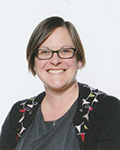 Rachel Peckover is the Primary PGCE Course Leader and also responsible for developing school partnership links.
Rachel Peckover is the Primary PGCE Course Leader and also responsible for developing school partnership links.
She enjoys getting out into the countryside on a sunny day. Staunton Harold has the perfect mix of green space, woodland walks, art, and a nearby National Trust tearoom!
Rachel says:
Previous experience before joining the ITE team
I taught for nearly 20 years in primary schools across Leicestershire, most recently working as a deputy head teacher in a junior school where I am now chair of governors.
Choosing to train teachers
After mentoring my first trainee over 15 years ago, moving into ITE became my ambition, which was further enhanced following completion of my MA, focusing on the important role that beginner teachers can play in school development. I knew that my heart lay in developing the next generation of teachers and, over the years, the career choices I’ve made have all led to this.
Teaching approach
I believe that it is the entitlement of every child to experience innovative teaching, which truly meets their particular needs, helping them to achieve their full potential, preparing them well for the next stage in their education, and allowing them to enjoy their time at primary school. I am also an advocate for creating communities of practice within the classroom that allow pupils to have ownership over their own learning.
Working with trainee teachers
My favourite part of the role is being out on school visits and seeing my beginner teachers in the classroom, interacting with their pupils. It’s a real privilege to see them grow in confidence over the year and leave the course ready to take on their own class.
Research focus
My recent research has focused on primary school systems, continuing professional learning, and school leadership and governance.
Advice for prospective teachers
You are entering an amazing profession with the opportunity to bring a bit of awe and wonder to the lives of your pupils. Sometimes, learning to teach will be hard, but on the difficult days, hold on to the wins and remember the difference you are making to the children. When you get it right, it’s the best feeling in the world!
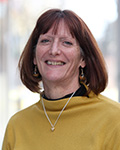 Esther Fulton is a tutor and admissions tutor for the Primary PGCE.
Esther Fulton is a tutor and admissions tutor for the Primary PGCE.
Outside of work, Esther has lots of happy places - walking her dog with her daughters, singing in a choir, skiing in the French alps, as well as watching her students graduate!
Esther says:
Previous experience before joining the ITE team
I worked as a primary school teacher for over 20 years in a range of different year groups in both mainstream and private schools. Over those years I held leadership roles in English, drama and PE.
Choosing to train teachers
After 20 or so years in classroom teaching, I decided to broaden my prospective and deepen my academic grounding in education by completing an MA Special and Inclusive Education at the University of Nottingham. After attaining this qualification, it felt like a natural progression to move into a teacher educator role and work with the future generation of primary teachers.
Teaching approach
Relationship building is my top priority as a teacher educator, just as it was as a classroom teacher. Taking time to listen and respond appropriately is something that I always try to focus on and continue to develop.
Working with trainee teachers
I love the enthusiasm and ideas that come from students. They all want to make a difference to the children in their care and to develop into the best beginning teachers they can be. The relationship I build with students is so important and I value what they bring to the course in the way that they learn and how they support each other.
Advice for prospective teachers
Don’t try to be a child’s best friend. Build up a relationship of mutual respect and always be the professional!
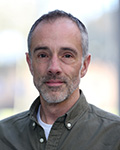 Dr Rupert Knight teaches a wide range of sessions on the Primary PGCE and is a course tutor.
Dr Rupert Knight teaches a wide range of sessions on the Primary PGCE and is a course tutor.
He is happiest surrounded by family and friends and says teaching is a job that’s all about people and you will be reminded of this every day!
Rupert says:
Previous experience before joining the ITE team
Before joining this team, I had a similar role at the University of Derby, working on both undergraduate and postgraduate ITE courses. Prior to that, I was a primary teacher in London and Nottingham, with various roles including working for the local authority as Advanced Skills Teacher and leading behaviour teacher.
Choosing to train teachers
I was looking for a new challenge and career direction within education. I was clear that I did not want to become a school leader, but that I enjoyed teacher development work with beginning and experienced teachers. I had also completed an MA in Education while teaching in school and this whetted my appetite for wider learning and more diverse teaching experiences.
Teaching approach
I would hesitate to be too precise about my philosophy, as I think the essence of being a teacher is to avoid adhering too closely to any one approach. Professional judgment is essential so it’s more about learning to think strategically and using the best approach for any given situation from a wide repertoire. One guiding principle, however, would be to make education a collective experience so that learners are active participants and diverse views and voices are valued.
Working with trainee teachers
I enjoy the teaching sessions themselves, as it’s very much like being back in the classroom as a teacher. It’s invigorating and inspiring to be working with a regular intake of new students and the new ideas and experiences that they bring. The other great privilege of the role, of course, is to be able to visit lots of schools – something that most practising teachers don’t get to do!
Research focus
I have researched and written in a few different areas but there are two main ones. The first is classroom talk, or oracy, looking at spoken language both as a skill but also as a means of working and learning. The other area of interest is in teachers’ professional learning and the ways that we can link the experiences of learning through theory and practice.
Advice for prospective teachers
Be kind to yourself and take things one step at a time. Teaching is a complex, challenging and ever-changing thing to do. That’s good news, as it means that this will be a career that will keep you interested and on your toes! The danger, however, is to aim for perfection and to dwell on the things that could have been better. Just reflect as a habit and develop little by little.
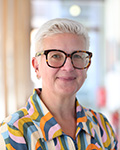 Dr Helen Victoria Smith is the curriculum lead for the Primary PGCE and lead for primary English, as well as the Disability Liaison Officer for the School of Education.
Dr Helen Victoria Smith is the curriculum lead for the Primary PGCE and lead for primary English, as well as the Disability Liaison Officer for the School of Education.
Helen says:
Previous experience before joining the ITE team
Prior to working in higher education, I worked for 13 years as a primary school teacher (across all year groups), specialising in literacy teaching and learning. During this time, I also completed a MA Children’s Literature at University of Nottingham. I then worked as a lecturer in a further education college running courses for parents/carers of primary aged children who wanted to find out how to support their children's literacy and numeracy development. These were closely linked to the Primary National Curriculum and explored ways that children's learning could be supported at home in informal and creative ways.
Choosing to train teachers
I initially left teaching to begin an ESRC-funded PhD which I completed in the School of Education at the University of Nottingham between 2014 and 2018. This was an ethnographic study of pre-school literacy in an East Midlands' town. It explored how the resources there were used and experienced by mothers to support their children's literacy development. The study shed light on the different ways in which mothers were 'taught' to support their children's learning depending on where they lived and where they went, which had implications for how 'ready' their children were for school, and how well they were likely to succeed when they get there.
Whilst completing my PhD I was fortunate to get the opportunity to do some part-time tutoring on the Primary PGCE, which I really enjoyed. When my PhD was coming to an end, I was then thrilled to secure a full-time post at the university.
Working with trainee teachers
I am always inspired by beginning teachers’ enthusiasm and commitment to making a difference to all children, but particularly those who can be disadvantaged within the education system. I also love that learning is reciprocal – we are constantly learning from each other!
Advice for prospective teachers
Approach teaching with an open mind - be prepared to get things wrong, change your mind and grapple with complex ideas.
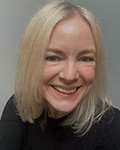 Rachel Turney is a tutor in the primary team.
Rachel Turney is a tutor in the primary team.
She loves being out in the country on a long walk or beside the sea with family or friends.
Rachel says:
Previous experience before joining the ITE team
I started my career teaching in mainstream primary schools. I then went on to specialise in teaching children with special educational needs and have been fortunate to work in a range of specialist settings and in local authority support services supporting both primary and secondary schools.
In more recent years I returned to teaching in primary school and combined this with the role of the SENCO. My most recent post was principal and SENCO of a new primary school in Derby. Setting up a new school was the most amazing experience, one of the most enjoyable aspects was developing my staff team and I look forward to building on this experience by supporting the next generation of teachers.
Choosing to train teachers
I love developing others and seeing them develop their skills and confidence. I think teaching is the most fantastic job and want to be part of shaping and developing our future work force and sharing my passion for inclusion and opportunities for all.
Working with trainee teachers
I enjoy seeing their knowledge, confidence and skills grow and develop and sharing all the amazing aspects of teaching in primary school.
Teaching approach
I believe successful teaching is rooted in positive relationships and providing meaningful learning activities that relate to the real world. All children have something wonderful to offer and teaching is about creating opportunities to nurture these individual interests, talents and creativity regardless of background or ability.
Advice for prospective teachers
Take time to build connections with your pupils, when times are tough these relationships make all the difference. Embrace the randomness of children, there isn’t any other job that will make you smile as much as teaching. Be kind to yourself and always have some emergency chocolate!
The English team
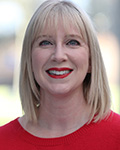 Fleur McCole is the subject lead, tutor and admissions tutor for the for the Secondary PGCE English.
Fleur McCole is the subject lead, tutor and admissions tutor for the for the Secondary PGCE English.
Fleur's happy place is a shopping centre full of new clothes, makeup, and shiny jewellery. It would also include a really yummy tapas bar that also serves cocktails where she'd happily chat over food with family and friends, before returning home for pjs and some TV.
Fleur says:
Previous experience before joining the ITE team
I knew from the age of 15 that I wanted to be a teacher of English, having fallen in love with the subject at GCSE (due to my own amazing teacher). As an A level student during the summer holidays, I started working as a teaching assistant at my local college to support adult learners in basics skills and ICT, this really showed me that I had a passion for teaching. After three happy years studying English at Loughborough, I was lucky enough to train to teach at the University of Nottingham in 2003. Following this I secured a role at a wonderful school just around the corner from the university! Thus followed many happy years working alongside the most amazing colleagues and pupils, teaching English and singing in the school choir. I have had many different additional roles within the school such as Head of Year 7, Transition Manager, ITT Coordinator, and Research Lead for Behaviour Management, all of which involved looking after new starters! I then moved to a role in the Trust as Deputy Director of the Teaching School for Secondary and CPD Lead (managing CPD across all secondary schools within the academy). I then achieved my dream job as a university tutor for the University of Nottingham in 2021, returning to where I originally started!
Choosing to train teachers
Teaching English is the most wonderful job, and watching my own classes being taught by a student teacher was just magic, but I realised that, to inspire more future teachers I would need to be in a role where I could have a wider reach. Teaching English should be about the power of a good story and the very nature of what it means to be human. Keeping this at the heart of teaching pupils is something I wanted to share with new and beginning teachers across the East Midlands.
Working with trainee teachers
The wonderful relationships we have with our student teachers is by far the best bit. The fact that our student teachers never really leave us and come back to see us, teach with us, and work with us makes this such a special job. Seeing our student teachers really flourish is also an absolute joy; watching a student teacher take those first steps towards becoming an independent practitioner is amazing!
Teaching approach
My teaching approach is that learning is a non-linear journey and one that should embody a feeling of joy. There is absolutely nothing wrong with enjoying learning, in fact, it should be encouraged and celebrated. Likewise, teachers should be able to laugh, feel happy and to enjoy their work too. Let’s create lessons that spark joy for both pupils and teachers.
Working with trainee teachers
The wonderful relationships we have with our student teachers is by far the best bit. The fact that our student teachers never really leave us and come back to see us, teach with us, and work with us makes this such a special job. Seeing our student teachers really flourish is also an absolute joy; watching a student teacher take those first steps towards becoming an independent practitioner is amazing!
Advice for prospective teachers
I can’t do just one!
- Find your teacher friends in school as this will make finding joy so much easier
- Take a lunch to school that will make you happy
- Give everything a good go!
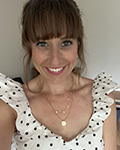 Katy Burridge is a tutor on the English course.
Katy Burridge is a tutor on the English course.
Away from work (and Nottingham), she Katy loves being by the sea. As a Londoner, the escape to the sea always provided the tranquillity, peace and calmness that she needed to re-energise and that’s never ever changed.
Katy says:
Previous experience before joining the ITE team
I first trained to be a teacher of Further Education, completing my PGCE for this field in 2008. Despite my FE focus, I actually ended up getting my first teaching job in a secondary school and that’s when I realised that I loved it. So, in 2009, I completed a school centred PGCE and officially became a secondary English teacher in 2010. During my time in secondary school I have experienced teaching in both inner city and county schools and this has helped develop my knowledge of inclusive teaching, behaviour management and assessment for learning. I have had experience in wider school roles such as assistant faculty director of English, literacy co-ordinator, head of key stage three intervention and lead mentor for PGCE English students. Beyond the classroom, I have helped design and deliver content for a city-wide GCSE booster day, helping border line grade students to push their understanding further in order to try and gain the next grade up (“Boundary Leaper Day”; a Derby Opportunities initiative). I have also provided training at a national level, talking about the positive impact that creative pedagogical approaches have on learning development for students in the secondary classroom. (We are Beta).
Choosing to train teachers
I have only left the classroom recently. Since September 2021 I was teaching in both the classroom and at university. Mentoring beginning teachers has always been my absolute passion (a role held for a decade) and it was through this role that I knew I wanted my career to focus on helping those who wanted to learn how to become teachers. In December 2022, I decided to take a leap of faith, follow my dreams and embark on the role of university tutor with full focus. It has been the best risk I have ever taken, and I feel so lucky that I get to call this my job.
Teaching approach
As a teacher, I have always strived to make my teaching approach creative, reflexive and meaningful for my learners and their individual needs. Getting students to think critically, encouraging them to think for themselves and have a voice is very important to me as a teacher. As such, my philosophy is centred around the belief that learning should be an active process, one where students can take ownership of their own learning and be encouraged to think for themselves. Teachers should be valued and trusted to design lessons which are tailored specifically to the needs of the class, where tasks are suitably scaffolded and accessible, but enough challenge is offered to build resilience, enhance problem-solving, strengthen team work and allow students to thrive independently as a result.
Working with trainee teachers
At the University of Nottingham, we are passionate about supporting our trainees in finding out what teacher they want to be. Assisting trainees in finding and refining their teacher identity and helping them to understand how to foster a safe, creative and passionate learning space is, I feel, one of the greatest privileges of the role. Teaching is complex and challenging, so being a source of support and encouragement for my trainees is at the heart of my role. Watching my trainees grow, adapt and achieve over the duration of the course is the greatest honour.
Research focus
My research interest is focused primarily on the transition process from primary to secondary school. Specifically, I am interested in investigating how effective curriculum consistency is, in the subject of English, at this transition point from key stage two to key stage three and what changes, if any, are needed to further enhance and improve this transition.
Advice for prospective teachers
Trust and believe in yourself and do this the most when the trust and belief feel like they’re wavering. If it means something to you, then it’s worth working for. Often, the things we want the most, take the most effort to get. But, with commitment, passion and drive, you will succeed, and you will realise that trusting and believing in yourself are the greatest gifts you can give yourself.
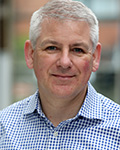 John Perry is a tutor on the English course.
John Perry is a tutor on the English course.
His happy place is on a beach with the sun on his face, listening to the waves gently rolling in.
John says:
Previous experience before joining the ITE team
I taught English for 25 years in English secondary schools. This included several years as a head of department, several years as a deputy head teacher and six years as head teacher of a secondary school in Cornwall.
Choosing to train teachers
I always wanted to move into Higher Education and finally felt that I had sufficient experience. I hope that my experience in schools can be of use to the next generation of teachers.
Teaching approach
Always encourage beauty, excitement and variety in learning (I’ve borrowed that from someone else though!)
Working with trainee teachers
I love their enthusiasm and energy as well as their ability to make me challenge my own thinking.
Research focus
I research the place and purpose of English in secondary schools.
Advice for prospective teachers
Take the job really seriously, especially the pupils, but do not take yourself too seriously.
The geography team
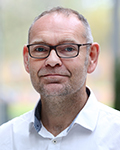 Mal Kerr is the subject lead, a tutor and admissions tutor for the geography course.
Mal Kerr is the subject lead, a tutor and admissions tutor for the geography course.
He is probably happiest mid mountain bike ride – covered in mud, on top of a hill with the sun shining on him – and the promise of a great big slab of chocolate cake at the next café!
Mal says:
Previous experience before joining the ITE team
I studied the PGCE course here at the university in the early 1990s, and subsequently went on to teach at local schools in the East Midlands. I have been a head of geography, an advanced skills teacher for the Local Authority, and have been a pastoral assistant head (oversight of KS3). Whilst I was a deputy head teacher, I focused on improving the quality of teaching and learning with a particular emphasis on using experienced colleagues in school to mentor emerging teachers. As a head of school, I had a teaching and learning remit across three schools within a federation and led post-16 across the same three schools. As a head teacher, I have worked in challenging schools embedding supportive cultures, focusing on systematic developmental approaches for teachers at all levels of their careers. I have also led NPQH training for emerging and new headteachers and worked in different trusts undertaking quality assurance of their ITE provision. And most importantly I love teaching geography!
Choosing to train teachers
I am a passionate geographer and really missed the subject immersion and the opportunity to think and practice exclusively in what is my comfort zone! The opportunity to work with, and nurture, emerging teachers was my main driver for entering the university ‘space’. The idea of allowing emerging teachers to explore and grow their own teacher identity was too attractive a proposition to miss!
Teaching approach
As a teacher my main focus was to shape and share high quality learning that had a clear purpose – and led to pupils leaving my lesson knowing that they had learnt something new – be it a skill, key knowledge or a new (or different) way of grappling with a complex issue – very possibly a wicked problem! My practice has always centred around building core knowledge and doing something with it….really an expression of powerful geography. I am a firm believer of rich and deep experiences and love fieldwork as it allows the world, which is inherently complex, to be observed, experienced and made sense of first-hand.
Working with trainee teachers
I have a passion for nurturing creative, exciting and brilliant emerging geographers – practitioners who are critically aware, reflective, love their subject and want to create high quality learning for, and with, their pupils! I love the passion for learning that younger colleagues share and their willingness to explore learning and take risks which positively impacts on their own emerging practice.
Research focus
My main focus in on building sustainable coaching communities that cater for all levels of experience. This evolution of support scaffolds teaching ‘growth’ from mentoring in the early years through to coaching as experience, capability and confidence grows. I am also very interested in the creation of exciting curricula that allows for strong learning sequences that build greater depth of learning for young people as they progress through geography.
Advice for prospective teachers
I believe in the ‘TOP’ model – trust, openness and positivity. I believe if these three ingredients can surround you in your career you will be brilliant! Of course, you should add in strong subject knowledge (never jump on a trampoline without the springs!), the bravery to take risks – and effectively using the subsequent learning …..and finally a great big chunk of humility!
 Alex Booth is a part-time tutor on the Secondary PGCE Geography course.
Alex Booth is a part-time tutor on the Secondary PGCE Geography course.
He can think of fewer better days than yomping up a hill in the Lake District, followed by a well-deserved pint in front of a roaring fire.
Alex says:
Previous experience before joining the ITE team
After graduating with a geography degree from Durham University in 2014, I made the trip further south (via a brief stint at home on the Isle of Man) and had a fantastic year at the University of Nottingham, graduating with my PGCE in 2016. Since becoming a teacher, I have remained local and have been happily teaching geography at a comprehensive secondary school in Derbyshire. Although my motivation has been to be the best classroom teacher I can, I have also held responsibilities for whole school curriculum development and am currently head of department. Alongside my teaching, I am studying for my PhD at the Institute of Education and work closely with the Geographical Association, colleagues across the East Midlands, and the university's School of Geography to foster collaborative teaching and learning opportunities in geography.
Choosing to train teachers
As a third-generation geography teacher, the lure of the classroom was (and is) strong! Despite working part-time on the PGCE course, I am still fortunate enough to combine my time at Nottingham with my teaching job. Indeed, it was after mentoring trainee teachers that I was struck by how rewarding the experience was. Rightly so, a great deal of attention is placed on the importance of educating the current youth of today to make the most of their futures. However, crucial to achieving this is developing inspiring, knowledgeable and dedicated teachers. Knowing that you are, in some way, equipping our next generation of teachers with these qualities is an incredibly rewarding and motivating feeling.
Teaching approach
I suppose my teaching philosophy can be summarised in three words: authenticity, criticality, and decency.
Inspiring pupils to grapple with geographical concepts, to make links between their own experiences and the world ‘out there’ is so important. Throughout their time at school, pupils need to be initiated into the discipline of geography. They need to know what it means to think and act like a geographer and be equipped to apply this mindset to their own lives; outside the classroom and in the future.
With a seemingly enormous market of ‘best practice’ tools and ‘teaching hacks’ available, it can be very easy to pick up a ready-made lesson and simply deliver it. Without promoting your own authentic voice, and being a critically-minded teacher, it can be difficult to inspire that next generation of geographers. These qualities can strengthen your classroom decision making, and act as a shield against the many impositions on your time and energy.
Imparting these values on pupils is so important, too. Act with decency and hold pupils to the same standards that you hold yourself. And, most importantly, enjoy yourself!
Working with trainee teachers
As is probably evident already, I feel incredibly privileged to work with trainee teachers. Hearing about those ‘firsts’ (the first time you really felt you had made a difference to a student; the first time a lesson activity came together; the first teaching job you secure). It is an incredible privilege to share, at least in part, these experiences with trainee teachers. There are few better interactions than seeing ex-students at conferences, or meetings, and hearing of their successes and developments since leaving the PGCE course. Whilst as a PGCE student myself, the subject sessions inspired me to keep studying and researching education. To be in a position to impart some of that passion onto others is incredibly gratifying.
Research focus
My current PhD research is on the topic of teacher agency. In the current climate of recruitment and retention issues, a lot has been made of the de-skilling of the teaching profession. Teachers are finding it more challenging to teach in a way that they deem desirable, with many inspiring and passionate teachers leaving as a result. My research is focussed on how teacher’s interpret teacher agency, whilst better understanding how teacher agency manifests in their working lives. Alongside this, I have an interest in curriculum design, and have published on innovative teaching within geography on areas such as place-based learning, the importance of locational knowledge and inferrentialism.
Advice for prospective teachers
Just like laundry, a teacher’s work is never finished. Being disciplined and listening to your body is so important. Remember to find the time to carve out moments of rest and recuperation– after all, the teaching year is a marathon, not a sprint!
The history team
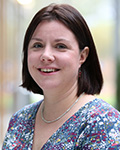 Victoria Crooks is the subject lead, tutor and admissions tutor for the Secondary PGCE History.
Victoria Crooks is the subject lead, tutor and admissions tutor for the Secondary PGCE History.
In her free time she is happy curled up with a book, a blanket and a nice big cup of tea.
Vic says:
Previous experience before joining the ITE team
I studied a BA Hons History at the University of Nottingham. I went on to gain my PGCE in secondary history in 2003 and in 2007 completed an MA Learning and Teaching, both at the university.
As a teacher, I worked in secondary schools in the East Midlands as a humanities teacher with history specialism at Key Stage 4 and 5. I also developed and taught an A level course in ethics as part of my second subject interest in religious education and theology, and taught A level General Studies throughout my classroom career.
I gained experience as a deputy head of sixth form in a large and outstanding joint school sixth form provision, and later as head of sixth form at a large secondary school, where I developed an interest in the wider Key Stage 5 curriculum.
In 2007/8 I was involved in a DfES National Strategy project developing resources and guidance for teachers working with advanced learners of English as an additional language. It was through this that I developed a particular interest in working with bilingual and multilingual learners.
During my time in the classroom, I also mentored beginning teachers and acted as a teaching and learning coach with the Local Authority. This sowed the seeds for my current research interest in the mentoring and support of beginning and early career teachers.
Choosing to train teachers
I left the classroom following the birth of my first child. When I was offered the opportunity to work with beginning teachers as an associate tutor in 2013, I seized the chance to build on my experience as a mentor and coach in schools to develop my understanding of classroom practice through working with beginning teachers.
I enjoyed working with young people in schools, and I loved the head of sixth form role. A highlight of my current role are the visits I make to schools and being able to work with pupils, albeit in a different capacity. Young people deserve committed teachers of the highest quality. It is an enormous privilege to prepare teachers for the classroom to do this exciting and socially important work.
Teaching approach
Young children are naturally curious – this is their superpower! I believe that all children should have the right to a high-quality education which seeks to stimulate children’s curiosity and equip them with the educational tools to learn, to find satisfaction in developing knowledge, and be inspired to keep on learning.
In history, I want all pupils to be excited by and develop meaningful understandings of the past. I want their experiences of history to provide both a mirror and a window into a past – one that resonates with their own experience and exposes them to understandings of people, place and periods that are completely unknown to them at this present time. I want them to realise that studying history is not simply a case of learning an inert body of knowledge. Consequently, I hope to develop history classrooms that allow young people to engage in historical enquiries, understand the kinds of questions asked in historical scholarship, and use their disciplinary knowledge alongside their substantive subject knowledge to interpret the past. I want them to be able to engage critically with sources of evidence and to ask questions as to the validity of claims that are made in wider society. Ultimately my hope for all pupils is they finish their school history experience grasping how fundamental a knowledge of history is for their ongoing life as citizens in our country and our global society. I want them to leave with a curiosity to know more and to continue learning more, whether that is through academic study or, for example, visits to museums and watching documentaries on TV.
On the University of Nottingham History PGCE course we therefore seek to train teachers who draw on their rich subject knowledge, passion and enthusiasm for history to support young people to understand the discipline of history and lead them to develop nuanced understandings of the past.
Working with trainee teachers
I love walking alongside beginning teachers as they translate their own fascination for the subject of history into the ability to convey that passion and excitement to pupils in the classroom. Supporting beginning teachers to develop their own teacher identity is an honour. I see a significant part of my role as centring around preparing beginning teachers for career long growth. I want them to understand the power of engagement with research and the practice based theorising of the wider history education community, to allow them to develop effective subject specific pedagogies in their own classroom. It is always a real joy to encounter our beginning teachers at later points in their career, sometimes when they become mentors in our partnership, seeing how much they have developed in their practice as they build on these foundations.
Another key aspect of my role that I relish is supporting those who work with beginning history teachers. Supporting and promoting subject specific mentoring has become a real focus of my work with our University of Nottingham ITE partnership history mentors – having a knowledgeable and well supported mentoring team is vital for an outstanding teacher education partnership. I have then drawn on this work for the Historical Association (HA), presenting on subject specific mentoring as part of the ITE strand at the HA Conference and contributing to their Beginning History Teacher module resources on the HA website and their Early Career Development Programme. I am also co-chair of the History Teacher Educators Network (HTEN-UK) and enjoy supporting the work of other history teacher educators through this national professional network.
Research focus
I am very interested in how mentors can develop mentoring approaches that help beginning history teachers to make sense of generic educational research and pedagogies in subject specific ways. I am currently engaged in a research project with colleagues from the University of York and the University of East Anglia, examining the relationship between university-based and school-based teacher educators in supporting and developing beginning teachers. We have published the initial stages of this work in the Teacher Education Advancement Network (TEAN) journal and presented at the History Educators International Research Network (HEIRNET). I regularly present at the Historical Association on subject specific approaches to mentoring history ITE and ECT beginning teachers.
I am lead author for the book Mentoring History Teachers in the Secondary School with Routledge, which will be published at the end of 2023.
Advice for prospective teachers
Do not ever lose sight of what made you want to be a teacher. Love your subject and make continuing to engage with disciplinary developments and the wider subject community a priority. Becoming a teacher will be a career-long endeavour and holding onto your passion for your subject, and your core motivation for getting into the role, will enable you to continue enjoying and growing in the role.
Sally Burnham works part-time as a tutor for the history team and is a history teacher in a partnership school where she also mentors trainee history teachers.
Away from work, she enjoys being on the beach in Northumberland with miles of sand and sea and nobody else for miles.
Sally says:
Previous experience before joining the ITE team
I trained to be a history teacher in 1997 and have been a history teacher, head of history, an Advanced Skills Teacher, an ITT coordinator, an SLE and I am now a history teacher and a lead practitioner in one of our partnership schools. I have experienced both inner city and country schools and I have also had the opportunity to work closely with the Historical Association and the Schools History Project and have presented at national conferences. I have worked as a senior examiner with OCR and have worked with Hodder Education publishing history resources.
Choosing to train teachers
I am really lucky as my job means that I am still in the classroom four days a week. This means that I can continue teaching history to students which is my passion and then have the chance to share my love of teaching with trainees one day a week.
Teaching approach
As a teacher I want to inspire a love of history in my students and I am keen to ensure that this is for all of my students and so I endeavour to plan and teach lessons that enable all students to access, think and learn. History is more than just knowledge and I make sure my students have the opportunity to see how historians work, investigate the past for themselves and through this have the chance to think about who they are and where they come from. To me, school must be about more than results, we have a responsibility to help young people discover who they are and where they fit in the world and as a teacher I am keen to ensure that students have extracurricular opportunities so that they are ready to take the next steps in their lives.
Working with trainee teachers
Working with trainee teachers at the University of Nottingham is an amazing part of my job. Helping trainees discover what type of teacher they want to be and then working alongside them as they learn how to teach, a job that I love so much, is such a privilege. At the University of Nottingham we believe that you never stop learning as a teacher and even after the course is complete many of our trainees stay in touch, meet us at local and national events and share the development of their career with us.
Advice for prospective teachers
Remember the look in a student’s eyes when they understand something new for the first time – there is nothing like this and as a teacher you will make this happen every single day
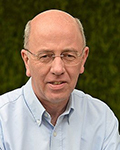 Gary Mills is a long standing tutor on the history course.
Gary Mills is a long standing tutor on the history course.
Gary has many happy places and feels lucky to enjoy the life that he does. He loves playing and listening to music – especially playing the piano. He collects books and enjoys reading. BUT above all of these his happy space is with his walking boots on and binoculars at the ready and being out in nature.
Gary says:
Previous experience before joining the ITE team
Prior to my appointment at Nottingham, I was a history education tutor at the University of Oxford, and whilst teaching in schools I worked closely with the PGCE course at the University of Cambridge. At the University of Nottingham I led the history PGCE course, and developed an exchange programme for postgraduate history education students with the University of Connecticut.
Choosing to train teachers
I loved working in the classroom and teaching history. As a teacher I became increasingly interested in working with beginning teachers and I was fortunate to be offered an opportunity to work with PGCE students at the University of Cambridge. From that point teaching history in the classroom became the second best job – I have the best job in the world.
Teaching approach
The ultimate aim is to develop excellent beginning teachers who will make a real difference to the lives of young people. Jointly we explore and investigate what this means and what it looks like to teach high quality history lessons that intrigue, engage and excite pupils. Yes there are times when key inputs are required and these lead to discussion and debate – we end up becoming co-enquirers around key areas of the curriculum, teaching approaches, learning and assessment. There are sessions that I teach where if student teachers do not emerge feeling a little bit angry or shocked, as well as enthused and feeling confident to experiment in the classroom – I am not doing my job!
Working with trainee teachers
The buzz and the excitement of working with people who love history and who want to pass on this love of the subject to young people is intoxicating. I enjoy the ways that I am able to support and help make the subject come alive and how together, the PGCE historian and myself, wrestle with understanding how young people learn. History also needs to be relevant and developing pedagogies to link past and present so that pupils not only ‘get it’ but see why it is important they understand it, is also a significant challenge that I love exploring with beginning teachers.
Research focus
My main research is centred on the teaching of the Holocaust and other genocides. I have held research awards from The British Council to work with history teachers in Rwanda, and have been a theme leader and co-investigator on two projects exploring the use of Holocaust and Nazi photography in classroom settings. As part of recent research I helped develop and curate The Eye as Witness exhibition, which provided a chance to explore new ways through which people engage with and view photographs.
My second area of work involves examining the use of testimony in classrooms. I was a steering group member and theme lead (Education) for Culture and its uses as Testimony. One key output for the projects has been the development of new teaching resources.
With US colleagues I have been the recipient of a Spencer Foundation award researching the use of Virtual Interactive Holocaust Survivor Testimony in museums and classrooms. Recently, with colleagues from the Maximillian University Munich, I have helped develop a new network of international scholars - Technology Meets Testimony [TMT] - investigating the future of Holocaust survivor testimonies.
My third area involves looking at how we teach historic climate and environmental change. I have recently been awarded a research award - Teaching Climate Change in History Education. This is work, that is ongoing with a colleague at UCL, is at a very early stage of development. We are exploring the idea of palimpsest landscapes and how we might use such approaches in history education.
Advice for prospective teachers
Love your subject and seek the same joy you have of history for your pupils.
The maths team
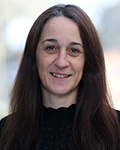 Claire Clemmet is the Course Leader for the Secondary PGCE and subject lead for the mathematics course.
Claire Clemmet is the Course Leader for the Secondary PGCE and subject lead for the mathematics course.
Her happy place is on the beach on a cold, windy day. She grew up in Ireland, where it is rarely sunny at the beach, so days like that remind her of home and provide restoration through the beauty of nature.
Claire says:
Previous experience before joining the ITE team
I completed my PGCE at the University of Nottingham in 1994/95 before starting my first teaching post in Oldham. I thoroughly enjoyed my time there, as I had the opportunity to work with a fantastic, supportive group of teachers who were enthusiastic about teaching mathematics in creative and interesting ways. Following a move back to Nottingham, I worked as a second in department in a culturally diverse, inner-city school, which provided great opportunities to continue to learn as a teacher. I was also a mentor for ITE students during this time, and found that I loved working with them to develop their practice, often learning a lot from them as well! After a career break, I worked in a local school as a mathematics tutor before starting work at the university as a tutor in 2011.
Choosing to train teachers
It was never my intention to leave the classroom, but I had really enjoyed my role as a mentor, working with student teachers to support their development. However, the opportunity to work at the university, and to become more involved with supporting student teachers, came up at a time when I was looking for a different challenge.
Teaching approach
As a teacher, I think my role is to make people curious, so that they notice something new or ask questions. This could be about a mathematical idea, the way pupils behave, the reasons why you might take a particular approach when teaching. Dialogue is central to learning, and as a teacher, I have learnt so much from the pupils and student teachers that I have worked with. So, I believe it is important to continue to be willing to listen to others, to be open-minded to new ideas and willing to try new approaches.
Working with trainee teachers
I love working with young people who want to make a positive difference to the lives of others. Whilst teaching looks easy from the outside, it is incredibly complex and difficult to learn, yet our student teachers make enormous progress throughout their ITE year. I feel privileged to support them as they become the teacher that they want to be, developing their understanding of mathematics, how others learn and their understanding of themselves as teachers.
Research focus
I have two main areas of research interest: the subject knowledge development of student teachers and the role of mentors in schools. Teachers need to develop specialised knowledge of their subject to support the learning of others. Being good at a subject yourself is a good foundation, and often the reason many become teachers, but it's not sufficient! A teacher needs to develop a deeper understanding of their subject. In maths, this means understanding how to build on prior knowledge, how to sequence and structure new ideas, how to represent and model mathematical ideas in a range of ways, how to deal with misconceptions that will arise when learning. Being able to draw on this knowledge in the moment of teaching enables teachers to be responsive to the needs of all the pupils they are working with, many of whom may struggle with maths. In the ITE year, student teachers have a lot to learn about maths and I am interested in understanding how to facilitate this through the design of our course. Mentors who support our student teachers on placements play a vital role in this development and my doctorate focuses on learning how mentors view their role in this area of development.
Advice for prospective teachers
Be kind to yourself - it is challenging becoming a teacher but also very rewarding. You need to be able to give a lot to other people, so making sure you look after yourself needs to be a priority so that you can support all the pupils you will be teaching. As you learn, you will make mistakes but there will be so much you get right too - take time to notice this. Strive to look for the positives within every day- they will be there!
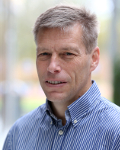
Marc North is tutor in the maths team.
Away from work, Marc is happy relaxing being in the sea with his surfboard and the sharks!
Marc says:
Previous experience before joining the ITE team
My teaching background is in secondary mathematics. However, prior to joining the primary PGCE team I worked as an associate head teacher for a large multi-academy trust in Nottingham city, with trust-wide responsibilities for school improvement work for mathematics and whole-trust approaches to assessment and data and research. This role gave me a breadth of school-improvement work for leadership, teaching and learning across all key stages and varied school contexts in the primary setting.
Choosing to train teachers
An aspect of my work has always involved professional development work with in-service teachers. Even when I was a secondary maths teacher and also while working as an associate head teacher, I continued to work with partner educational institutions to support the professional learning and development of teachers. For example, for several years I have run work groups for the Derby Research School, and East and West Midlands Maths Hubs that introduce teachers to innovate alternative teaching approaches. As such, the transition into teacher training felt like a comfortable move and a space that I was already familiar with. Besides, what better way to spend my time than working with beginning teachers who are passionate about teaching and who want to spend their lives making a difference to the children in our local communities.
Teaching approach
I believe that, as adults, we all have the capacity to learn independently. And, when you do learn something independently, you often learn more and remember what you have learned for longer. So, on this course I see my role as providing you with the right resources and support, then pointing you in the right direction – and gently handing over responsibility to you to do the learning on your own and by working closely with your classmates.
Working with trainee teachers
I love working with my group of tutees and seeing how they grow and develop, in an incredibly short space of time, from nervous and inexperienced beginning teachers to confident, passionate and highly effective early-career teachers. I am constantly inspired by the passion and enthusiasm that our students have for teaching and for wanting to make a difference in the lives of the children in their classrooms.
Research focus
Maths teaching and learning is still my main passion from a research perspective. I’m particularly interested in why so many children find learning maths hard and what we can do to make the subject more accessible and less daunting. I’m particularly interested in how we can use links to real-life contexts, together with active learning experiences, manipulatives, and representations to help children to experience learning in maths lessons in a more memorable way. I’m also interested in how we can adapt our teaching so that children don’t have to rely as much on their memorisation skills (because we know that this is so much harder for some children – including children with a special educational need).
Advice for prospective teachers
- Stock up on chocolate supplies – sugar will be your best friend!
- Be (or learn to be) organised – this is an essential skill of an effective teacher.
- Never lose sight of why you want to be a teacher – if you are doing this because you are passionate about making a difference to children’s lives, then nothing will ever seem like it’s too hard or too much work.
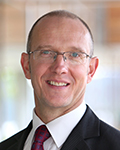 Mark Simmons is a tutor and admissions tutor for the course.
Mark Simmons is a tutor and admissions tutor for the course.
When not at work, Mark spends many happy hours in his garage!
Mark says:
Previous experience before joining the ITE team
I began teaching physics in 1985. I have since been a head of year, head of physics, primary year 5/6 teacher, maths teacher, second in maths and an Associate for Science in Transfer (AST) in maths, working in three secondary schools and two primary schools.
Choosing to train teachers
Having moved to working part-time after the birth of my first child, I was offered some work with the University of Nottingham and after experiencing this half a day per week, I was keen to apply for a job when it came up, as I felt I could be more influential as an educator of teachers.
Teaching approach
I like to engage and provoke as much thinking and interaction as possible. My dad jokes are legendarily groan-worthy!
Working with trainee teachers
They are lovely people almost without exception. They are moral, thoughtful, kind and courageous and it is a privilege to support them on their journey through the tough year that is the PGCE course.
Research focus
I am passionate about social justice and conduct action research with local teachers into successful strategies through which to teach mathematics to mixed attainment groups, #TMMAG for short
Advice for prospective teachers
Pace yourself and be a good grown-up.
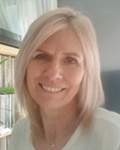 Professor Stefanie Sullivan is a member of the maths tutor team.
Professor Stefanie Sullivan is a member of the maths tutor team.
Her happy place is being with her family and dog, ideally on a ski slope, although that doesn't work for the dog!
Stef says:
Previous experience before joining the ITE team
I taught maths, PE and science in schools in the North East of England. I was the head of a maths department in my final post, before leaving and becoming a maths education consultant for several years before joining the university.
Choosing to train teachers
I was very happy in the classroom but also really enjoyed supporting other teachers and, in particular, mentoring new teachers. I decided to do a MA Education and, through that, became very interested in working in teacher training in a university.
Teaching approach
My core belief is that teaching is a relationship; if trust and respect are valued highly, then teaching can be effective and learning optimised. Teaching should be designed so students take ownership of their learning. Teaching should be personalised, offering support, enrichment and challenge, enabling learners to flourish.
Working with trainee teachers
I love helping new teachers progress, and gain confidence. It’s great watching them recognise how complex teaching is and I like supporting them to embrace that complexity and become passionate, thinking teachers.
Research focus
I am interested in teacher, and teacher educator, identity. I am particularly interested in the attitudes and beliefs that enable teachers, and teacher educators, to navigate political contexts, and national policies, in ways that enable them to thrive and enjoy their jobs.
Advice for prospective teachers
Immerse yourself in learning to be a teacher, but don’t make it your whole life. Pupils need happy teachers who enjoy their job but also have a life beyond the classroom.
The modern languages team
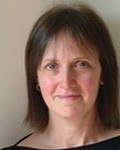 Dr Lesley Hagger-Vaughan is the course lead for the modern languages PGCE and convenes the Language Education Research Group - see research focus below for more information.
Dr Lesley Hagger-Vaughan is the course lead for the modern languages PGCE and convenes the Language Education Research Group - see research focus below for more information.
Away from work, Lesley has many happy places – places where she can spend time with family and friends. She loves spending time in the mountains and lakes of southern Austria, in the forests and fjords of Norway and the cafes of Brussels.
Lesley says:
Previous experience before joining the ITE team
I have been involved in teaching German and French, examining, advising and developing national policy in the field of languages education since the 1980s. I have significant experience of teaching and leading languages in schools through integrated, creative and interactive approaches which encourage the development of intercultural communicative competence. I held the role of head of world languages and then deputy head teacher of a large urban comprehensive school in the West Midlands. As a senior curriculum advisor for the Qualifications and Curriculum Development Agency, I was involved in the development of the Modern Languages National Curriculum and national languages qualifications. I have also held the post of principal examiner for German GCSE for a major awarding organisation, and I am a languages subject expert for the qualifications regulator Ofqual.
Choosing to train teachers
I have been involved in training teachers throughout my career in education as a school-based mentor and also running workshops for a range of ITE providers. After working in language education policy nationally for a number of years I moved to the School of Education at the University of Nottingham as a teacher educator/researcher. This role allows me to continue to work in close partnership with schools to train teachers at the same time as working on language education research and advocacy for language learning in schools.
Teaching approach
My teaching approach is informed by my research and my diverse professional experiences and is underpinned by a strong commitment to internationalisation, innovation, creativity, social justice and learner autonomy. My teaching fosters a futures-orientated approach that supports our student teachers to become effective, confident critical educators, equipped with an international mind-set and flexible skills to address real-world issues. This approach ensures that they can be responsive to the challenges of language teaching and learning in increasingly multilingual contexts in a multilingual world where language use is dynamic and unpredictable.
Working with trainee teachers
I love working in partnership with our school-based mentors to support our trainee teachers to develop their own theories of practice, enabling them to become inspirational, innovative teachers of languages who are able to help young people to gain the linguistic competencies and intercultural skills they need to thrive locally and globally in increasingly multilingual and multicultural societies. Many of our trainees go on to work in local schools and continue to work closely with us, become mentors themselves and help us to develop and shape the modern languages PGCE course.
Research focus
I publish in the field of languages education and my particular research interests include language education policy and practice, curriculum and assessment and 14-16 learner participation. I have worked on a number of European funded research projects and have a particular interest in how schools understand and enact language education policy. I am currently co-leading the Culture and Language Integrated Classrooms (CLiC) curriculum and assessment design research project with my wonderful PGCE colleagues Dr Ruth Koro and Eva Vicente.
An important aspect of my work is facilitating research knowledge exchange through the Language Education Research Group (LERG). The LERG is a thriving, scholarly, multilingual community of practice for language education researchers and educators in the East Midlands who are part of the university's ITE partnership of schools. It contributes to the University of Nottingham’s strategic priority to support civic partnerships, connecting academic research knowledge with the day-to-day practice of language teachers, thereby stimulating research, informing and improving classroom practice and impacting the languages education of young people.
Advice for prospective teachers
Maintain a focus on the ‘bigger picture’ as to why learning an additional language matters and a focus on what kind of languages teacher you want to be. Listen carefully to the voices of your language learners - listen to, respect and take account of their views.
 Dr Ruth Koro is a tutor on the modern languages course, as well as the admissions tutor. She is the lead for the Schools and Society module on the Secondary PGCE course, covering broader aspects of teachers’ professional responsibilities with students across all subjects. She is also the digital lead for the ITE team, supporting colleagues and students with all things IT-related and working on developing digital content and approaches across our ITE courses.
Dr Ruth Koro is a tutor on the modern languages course, as well as the admissions tutor. She is the lead for the Schools and Society module on the Secondary PGCE course, covering broader aspects of teachers’ professional responsibilities with students across all subjects. She is also the digital lead for the ITE team, supporting colleagues and students with all things IT-related and working on developing digital content and approaches across our ITE courses.
Ruth's happy place is Marseille, in France, where she grew up and where most of her family still lives. She always looks forward to returning there during the summer, catching up with loved ones and enjoying the weather, the sea, the food – and of course, enjoying switching off and recharging before the start of a new academic year!
Ruth says:
Previous experience before joining the ITE team
I initially explored ways to train as a teacher in my home country, France, but was put off by the lack of practical experience on these programmes. After exploring teacher training in England, where I had already been living for six years, I completed my PGCE at the Institute of Education (UCL) in London. I was offered a job in one of my placement schools, and started my teaching career in East London, where I taught for eight years – gaining a range of responsibilities: assistant head of year, IT lead and initial teaching coordinator in my first post, then as second in department in my next school. I then ventured outside London, first to Hampshire then to Kent, as a head of department and member of the senior leadership team – before a final move to Essex leading a large faculty of 12 staff, while working on my Professional Doctorate in Education (EdD).
Choosing to train teachers
I mentored trainee teachers for all the 15 years of my teaching career, and this was a role I really enjoyed. The prospect of contributing to more beginning teachers’ development appealed to me, as it was a way to continue having a positive impact on young people in schools, but on a larger scale. I am also interested in research in education, so working in a university was a good way to combine these two interests.
Teaching approach
I am quite creative, and I have always enjoyed designing curriculum content with the aim to enthuse learners – whether as a teacher or as a university tutor. I believe that teachers, no matter the constraints of the role, can have a greater sense of agency and empowerment as curriculum creators – there may be a curriculum to follow, but it is down to us as teachers to make it come to life in the classroom, and most importantly, to make it engaging and meaningful to our own context and learners.
Working with trainee teachers
I really enjoy the constant flow of ideas, reflections and exchanges as trainees develop their understanding of what it means to be a teacher, and of the complexities of the role. Every trainee is different in their journey to becoming a teacher, building on their own background and experiences, and this diversity of perspectives is something I really value. It is also really rewarding to have a part in supporting new generations of teachers each year, and to see them grow throughout their careers as we often keep in touch and carry on working with each other in different ways long after they have completed their PGCE course.
Research focus
I have a particular interest in innovative curriculum models and in curriculum design, with a focus on approaches enabling the integration of language and culture. My EdD thesis aimed to explore the value of integrating language learning with content from other areas of the curriculum (history) to see if this could help develop secondary language learners' intercultural understanding and enhance their motivation for language learning (it did!). I am now working on a book chapter to share some of this work more widely, after presenting key findings at a range of national and international conferences.
I am also currently working on two research projects:
- The Culture and Language Integrated Classrooms (CLiC) project involves colleagues and local language educators, to co-design/adapt curriculum content in order to foster greater secondary pupils’ cultural awareness and intercultural understanding
- The second project is working with our current secondary PGCE students, exploring the way in which our Schools and Society module supports beginning teachers to develop their professional identity, and the dispositions they need to become effective, informed educators, able to support inclusive practices and promote social justice in education
Advice for prospective teachers
Be prepared to have your perspective challenged and embrace this process during the PGCE and beyond: no matter how much you, or those around you, know about teaching, or about your subject, nothing can quite prepare you for the complexity and demands of the role – or for all the rewards, big or small, that it will bring! But know that you will be supported and guided at all times throughout this process.
The science team
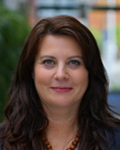 Jo Hancock is a PGCE tutor and leads the biology, chemistry and physics strands. She also teaches the science element of the Primary PGCE.
Jo Hancock is a PGCE tutor and leads the biology, chemistry and physics strands. She also teaches the science element of the Primary PGCE.
Jo loves her garden, being outdoors with her dogs (and chickens) and walking in Derbyshire. But her happy place is probably in a small venue, watching a slightly dodgy tribute band with my friends and singing along to some 80s cover versions!
Jo says:
Previous experience before joining the ITE team
I came to teaching as a career changer from the chemical industry. I completed my PGCE at the University of Nottingham in 2001 and taught chemistry, physics, maths and biology in two Derbyshire secondary schools before joining the ITE team in 2014.
Choosing to train teachers
In school, I secured the post of advanced skills teacher and I was very fortunate to be part of the leadership team developing learning and teaching from KS3-5. Part of this role was to support experienced and beginning teachers to develop their pedagogy and practice in the classroom, which I loved! I mentored PGCE students in school as part of this role and eventually decided that this was a job I wanted to learn more about, so I joined the ITE team at the University of Nottingham.
Teaching approach
In life, I think that people do their best when they are comfortable, supported and know that others believe in them. That is the approach I like to foster in my classroom, in school and university.
Working with trainee teachers
Our trainee teachers are encouraged to reflect on their experiences in school to develop their understanding of teaching and how children learn science in schools. As their ‘teacher’, being part of this process is very exciting; hearing students make sense of their experiences in school using ideas from theory and practice, and then seeing them develop their own teaching in the classroom when we visit them in school is fantastic. Teaching is often described as a craft and being part of this craftwork is what I like most about the role.
Research focus
This may sound a bit odd coming from a secondary science teacher, but my research interest is in primary school science. I am interested to understand more about how the science curriculum is led in primary schools and how this prepares children for their experiences at secondary school.
Advice for prospective teachers
Keep an open mind about the type of teacher you might want to be, the children you might want to teach and the school you might want to work in. Schools are incredible places that can transform lives, so try not to judge schools, teachers or children until you really get to know them. Who knows where you could end up!
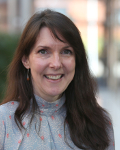 Helen Bowhay is Director of Initial Teacher Education and a member of the science tutor team.
Helen Bowhay is Director of Initial Teacher Education and a member of the science tutor team.
Away from work, Helen loves long walks in the countryside with her dog, husband and children.
Helen says:
Previous experience before joining the ITE team
Prior to joining the university in 2004, I was a science teacher working in north Nottinghamshire. In my last role in school I was responsible for the coordination of science for Key Stage 3. I was a founder member of the schools IQEA (Improving the Quality of Education for All) team who worked with colleagues from schools across the East Midlands, with the aim of increasing the range of teaching and learning strategies used within schools. I was also involved in the national pilot on high order thinking skills.
Choosing to train teachers
Throughout my time in school I always enjoyed supporting new science teachers joining the profession in my role as a school-based mentor. It was professionally rewarding to see new colleagues grow and develop into effective classroom practitioners and to know that I had been a part of that. I actually was not looking to leave the classroom but happened to chance upon the advert for a science tutor position here at the university and decided to apply. Now, after nearly two decades in the role, I have supported the professional development of hundreds of new teachers who have gone on to have successful careers in teaching and make a positive impact on the lives of the young people they teach.
Teaching approach
In my teaching I aim to foster communities of practice in which the assets that each person brings to the community are valued and respected. Teaching is a complex thing to learn to do. However, through sharing and learning from each other’s experiences, each member of that community has access to a wealth of resources that will support their own development and the development of others. I strive to create safe learning spaces in which people can learn, be inquisitive and collaborate.
Working with trainee teachers
Whilst our beginning teachers are only with us for a relatively short period of time, we form strong relationships and it is a delight to get to know them as individuals. Everyone brings something unique to the course and each person’s journey through the course is different. In light of this, I am always thinking and researching into ways to adapt my practice so that I can respond and support each person to reach their potential. There is nothing more professionally rewarding than seeing our students’ professional growth and development over the course of the year and beyond. I also really enjoy my time working with colleagues in school, particularly during school visits. There is nothing quite like being back in the classroom!
Research focus
I am committed to diversifying the teaching workforce so that it better represents the communities that it serves. My research interests lie in looking at effective ways we can support beginning teachers from minority backgrounds to flourish in the profession. My current research focusses on the lived experiences of autistic teachers.
Advice for prospective teachers
There is no manual for teaching and no one way to teach!
 Ellie Wood is a tutor for the science PGCE.
Ellie Wood is a tutor for the science PGCE.
Ellie loves being outdoors. She grew up in Devon and spent much of her life exploring the beaches, local country and national parks. This enjoyment has stayed with her and she regularly spend weekends hiking and camping in the Peak District with her husband and dog.
Ellie says:
Previous experience before joining the ITE team
Prior to joining the ITE team I trained as a biology teacher in 2013, completing a PGCE at Loughborough University. I then worked in a number of schools that were part of a large multi-academy trust in Nottinghamshire. My roles included head of KS3 science and head of biology. Alongside these roles I worked with PGCE and SCITT students, as well as beginning teachers in science. I was also responsible for co-ordinating the KS3 and biology curriculum across a number of secondary schools within this trust, developing common approaches for resources and assessment. Outside of the classroom, I work as an examiner for AQA, marking the biology GCSE exams in the summer.
Choosing to train teachers
During my time in schools I worked with a number of PGCE, NQT and SCITT colleagues and I really enjoyed helping teachers to develop their practice. It gave me the opportunity to reflect and improve my own practice as well as support them over the year. I was able to see the difference that working with a teacher could make to the large number of pupils that they taught, and I found this incredibly rewarding. I decided in 2020 that it was right to make the move to work with trainee teachers at the university.
Teaching approach
As a teacher, I have always strived to ensure that my teaching approach is creative, reflexive, interesting and inclusive for all learners. Having trained as a science teacher I follow a discovery approach. Allowing the students to find out ideas for themselves, become critical thinkers and to share their own thoughts and ideas within lessons. I believe it is important for students to learn from each other and for the teacher to facilitate the learning within the classroom.
Working with trainee teachers
I really enjoy working with trainee teachers as they bring lots of new ideas and challenges to the sessions. Seeing the trainees develop over the course of the year, starting to find their teacher identity, develop their teaching skills and honing their practice to deliver fantastic lessons is a huge privilege. Knowing that they are making a huge difference to the pupils in schools in the Nottinghamshire area is rewarding.
Research focus
I am currently a Professional Doctorate in Education (EdD) student at the University of Nottingham and my doctorate has a focus on outdoor learning and the relationship that secondary schools have with this practice.
Advice for prospective teachers
Teaching is an amazing job, however, it is easy to strive for perfection but my advice is to just be yourself and to learn from your mistakes. Taking the time to learn from your university tutors, mentors in schools and colleagues will help you become the best teacher you can be.